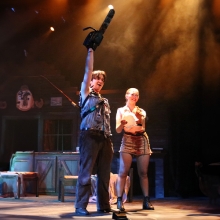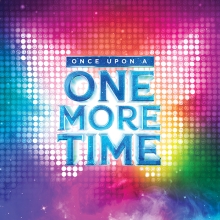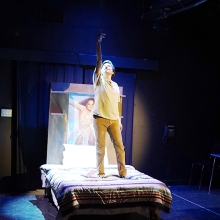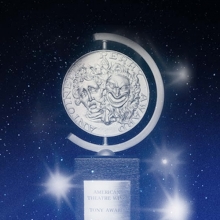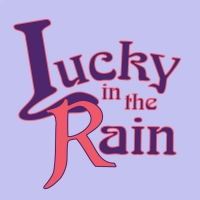
Full Synopsis
Act One
An elderly man steps out in front of a street scene in Paris. He announces that it is 1927, and that this picturesque city is the city in which he spent his youth ("Montmartre"). This man introduces us to a younger version of himself, Henderson Booth. Booth is just arriving in Paris, "Where everybody is young, broke, half-drunk, an artist, a genius, a phony, all of the above and always in love." Booth bumps into an attractive young woman, Jane Wiley. She is American and sees Booth as a person much like herself when she first arrived in Paris. She decides to help out the young reporter and takes him to the newspaper for which she works, The Defender.
Jane introduces Booth to Mike Malone, the cynical Managing Editor of The Defender. Mike is ready to dismiss Booth, but Booth impresses Mike with his tenacity ("I'm Shooting High"). Booth is hired, although Jane is a bit miffed when Mike gives him part of her beat. Jane introduces Booth to the colorful staff: Zach Monroe, photographer and Jane's ex-lover; Robert Leary, sports columnist and compulsive gambler; Regine (Reggie) Duvalier, fashion reporter and Robert's lover – although she's married to a man named Maurice. As Robert tries flirtatiously to weasel some money out of Regine, and Booth tries flirtatiously to compliment Jane, both men sing about the women in their lives ("Exactly Like You").
Elder Booth tells us that, after a month, his younger self is junior editor and in charge of the book review section. Booth's contentment is interrupted when Mike storms out of his office bemoaning that there's no one to cover the Lindbergh landing. Jane excitedly offers, but Mike gives the story to Booth, with Zach as photographer. Zach's jealousy of Booth's friendship with Jane makes him give Booth wrong directions so he won't get the story. Jane finds out about this deceit and gives Booth a story that she wrote on Lindbergh. Relieved, he files the story. Suddenly, two boisterous women burst into the office – Gertrude Stein and Alice B. Toklas. Gertrude demands that he write a review for her new book, but Booth says that he doesn't understand it. She sees his confusion and senses that he's having girl trouble as well. She and Alice offer him some cheery advice ("Sunny Side of the Street").
Mike explodes into the room exclaiming that the owner of the paper, General Maclean, and his mother, Momma Maclean, are on their way. They enter, and the General goes around to various staff members, commenting on their stories. The General asks who wrote the thrilling Lindbergh story and if there will be a follow-up feature. Mike introduces him to Henderson Booth. With the staff's assistance, Mike "follows up" by telling the General all about Lindbergh's spiritual and heroic journey ("Comin' in on a Wing and a Prayer").
Momma Maclean, a kleptomaniac, wants to go shopping to pick up (steal) some souvenirs. Jane and Booth are volunteered by Mike to take her, and she is excited and delighted ("It's a Wonderful World"). Later, the General becomes fascinated with a beautiful jazz singer, Josephine Baker ("Doin' the New Lowdown"). He joins in during her number, eventually stripping down to his 'drawers" in the process! As the night wears on, Momma falls asleep in a pram that she stole, and Jane and Booth finally have some quiet moments together by the Seine ("This Is a Lovely Way to Spend an Evening").
Elder Booth once again brings us up-to-date. Booth and Jane have become more than friends. Regine announces that her husband, Maurice, has asked her for a divorce because another woman is carrying his baby. Robert thinks that this is an outrage and demands that she stay married. Jane sees Regine crying and finds out that it's Regine who is pregnant and that Maurice is fictional. She thought that being married made her more appealing to Robert. Now, she had hoped that he would support her "fake" divorce and ask her to marry him because he loved her ("I Walked In").
Mike again bursts in telling Jane that he is sending her on assignment to London for a month. Booth and Jane agree to stay faithful by writing every day and talking on the phone now and then. They will count the days until they are together again. Elder Booth admits, "I only made it to seven."
Because Booth and Zach are in love with Jane, they both write to her ("Where Are You?"). Booth's reverie is interrupted by Isadora Duncan wrapping a scarf around his throat, accusing Booth of writing inaccurate information about her in the paper. Although she hates his story, she loves his writing and asks him to help her with her autobiography. Booth is delighted, and, as they exit together, Elder Booth reappears and informs us that Isadora "was a postgraduate course in life and love."
Alone in Isadora's hotel room, Booth's resistance falters. With some champagne and a few suggestive words, he succumbs rather easily ("Love Me as Though There Were No Tomorrow"). Elder Booth muses that he thought it would all be over by the time that Jane returned, but "the days passed so quickly, I forgot all about tomorrow in today."
Jane returns and soon finds out about Booth's affair with Isadora. Heartbroken, she commiserates with Regine about love and how nothing seems to go right ("When Love Goes Wrong"). Zach convinces Jane that they should try again, while, on the Riviera, Booth and Isadora continue their affair ("Here Comes Heaven").
Act Two
Elder Booth begins Act Two by describing that extravagant summer that he spent on the Riviera. It is there that Isadora takes Booth out to meet the high society folk and teaches him that one must constantly flatter them ("You").
Elder Booth tells us that Jane has sent Zach away and now suffers alone in anguish, thinking of Booth ("I Must Have That Man"). Elder Jane interrupts Elder Booth's story in order to set the record straight. In her recounting, Booth keeps calling from France, begging her forgiveness ("I Couldn't Sleep a Wink Last Night"). She tells Booth that Zach is with her, and, stunned, Booth hangs up. Jane then realizes that being with Zach is a mistake and asks him to leave, but not before he pleads his case ("Don't Blame Me"). Booth realizes his foolishness and, although he's had a wonderful time with Isadora, he knows that he must go back to Paris – to work... and to Jane. Isadora understands and sadly bids him goodbye ("Love Me as Though There Were No Tomorrow – Reprise").
As soon as he returns, Booth is offered Mike's job as Managing Editor. Mike is leaving for a job in Berlin. It seems as though the General loved Booth's pieces on the Riviera and felt that he was the perfect choice to take over – despite the fact that Mike had promised the job to Jane. Booth wants to prove to Jane, and to himself, that he can succeed and turn The Defender into a respectable paper. The staff works hard – except for Zach – and, within a few weeks, the circulation doubles. Feeling frustrated and dejected, Zach turns his attention to Regine and tries to convince her that he is perfect for her ("South American Way").
The great success of the paper prompts a rival paper to buy it in order to crush the competition. This means that the staff will lose their jobs but they do not want to stop writing or working. Jane then realizes that they are free to publish their own paper in their own way, and they begin work on The Paris Pretender. Booth even enlists Gertrude Stein to help. She is thrilled and flattered by everyone's attention, and the staff gathers to bolster her ego ("You're a Sweetheart").
The Paris Pretender becomes "the rage of the intelligentsia." Robert sees that Regine is preparing to leave and finally confesses his lies to her. He professes his love for her but reminds her that he's a broke gambler ("I Can't Give You Anything but Love"). She is not totally convinced but also confesses her lies to Robert. She just wanted Robert to love her. At last, he asks her to marry him and she accepts.
The General enters threatening to close down The Pretender and blacklist the staff with all other newspapers. Zach seems to be on the General's side until he shows the General a scandalous photo of himself with Josephine Baker ("Doin' the New Lowdown – Reprise"). The General lets the paper continue and pays an additional $1,000 for costs. The money is still not enough to keep the paper running, so everyone – except Zach – agrees to give the money to Robert and Regine as a wedding gift. As they prepare to publish the last edition, Booth tries again to win back Jane's affections ("The Music Stopped"). A teletype interrupts with news of Isadora's death in a car accident. Booth believes that "Isadora would like to be mourned with champagne" and asks Jane to save him a seat at the wedding – near her.
Everyone gathers and celebrates the wedding ("It's a Most Unusual Way"). Robert seems unusually anxious, and we find out that he has bet all of the "gift" money on a horse named "Wedding Day" (another long shot) and that the race is during the wedding. Luckily, the horse wins, and Robert and Regine have enough money for themselves, as well as to share with the staff. On a whim, Jane asks Booth if he would give up his new job in New York to follow her to Berlin. Surprising her, he answers, "YES!" As rain begins to fall, he proposes marriage, and she happily accepts ("I Got Lucky in the Rain").
As Elder Jane and Elder Booth watch the scene fade, a Young American enters speaking in broken French. They point him to a hotel, and Elder Booth tells him, "I stayed there when I first came to Paris. Bon Chance!"
Show History
Inspiration
Regarding the impetus for this show, Sherman Yellman wrote in the program notes for the original production, "There is an underlying sadness in these optimistic American songs today. When we hear them, we feel a longing for a simpler time and we sense our loss of innocence. It is part of the fantasy to believe that Paris 1927 was pure gold... but this musical is not about the underside of Paris life. It is a celebration of a golden era of romance and self-discovery. Too many honest and gifted reporters found Paris 1927 to be a paradise for youth to doubt it now. Lucky in the Rain is my homage to those men and women."
Productions
Lucky in the Rain premiered at the Goodspeed Opera House on July 9, 1997.
Cultural Influence
- In 2000, a CD of the show was released and featured an all-star cast that included Lillias White, Malcom Gets, Debbie Gravitte and Barbara Cook.
- Lucky in the Rain brings some of 1920s Paris' legendary inhabitants to the stage, including Pablo Picasso, Ernest Hemmingway, Isadora Duncan, Josephine Baker, The Fitzgeralds, Gertrude Stein and Alice B. Toklas.
- The score of Lucky in the Rain features a bevy of popular standards, including "I Can t Give You Anything but Love," "Doin' the New Low Down" and an unforgettable version of "Sunny Side of the Street."
Trivia
- The cast and creative team of the original production included several names that would go on to make their marks on Broadway a few short years after Lucky in the Rain debuted. The production was directed by Christopher Ashley (All Shook Up) and choreographed by Randy Skinner (42nd Street). Featured in the cast were Jane Eyre's Marla Schaffel and The Full Monty's Patrick Wilson. Musical duties were in the hands of two industry veterans, Wally Harper and Peter Matz, who collaborated to showcase Jimmy McHugh's music in all its timeless glory.
- Sherman Yellen is both a Peabody and Emmy Award winner.
Critical Reaction
"Light and stylish... always entertaining... Lucky in the Rain offers nearly two and a half hours of carefree nostalgia"
– Weekly Variety
"Yellen exhibits great affection for period and, more importantly, a real flair for weaving songs, mostly by Jimmy McHugh and Dorothy Fields, into his then-and-now remembrances of things past. Christopher Ashley's direction fluidly translates the book and songs into a breezy, smart, romantic production whose pace never flags."
– Hartford Courant
Billing
- Conceived and Written by
- Music by
- Lyrics by
- Additional Music and Lyrics by
Requirements
| Music by | Lyrics by |
| JIMMY McHUGH | HAROLD ADAMSON and DOROTHY FIELDS |
Video Warning
In accordance with the Performance License, you MUST include the following warning in all programs and in a pre-show announcement:ANY VIDEO AND/OR AUDIO RECORDING OF THIS PRODUCTION IS STRICTLY PROHIBITED.
Included Materials
| Item | Quantity Included |
|---|---|
| LIBRETTO/VOCAL BOOK | 25 |
| PIANO CONDUCTOR'S SCORE | 2 |
Production Resources
| Resource |
|---|
| HOW DOES THE SHOW GO ON-10/CS |
| HOW DOES THE SHOW GO ON? |
| LOGO PACK |
| LOGO PACK DIGITAL |
| REFERENCE RECORDING |
| TRANSPOSITIONS-ON-DEMAND |
STANDARD ORCHESTRATION
| Instrumentation | Doubling |
|---|---|
| BASS | |
| DRUMS | BELLS , CHIMES , COWBELL , TRIANGLE , TYMPANI , VIBRAPHONE , WIND CHIMES , WOOD BLOCK , XYLOPHONE |
| REED 1 | ALTO SAXOPHONE , CLARINET , FLUTE , SOPRANO SAX |
| REED 2 | BASS CLARINET , BASS SAXOPHONE , CLARINET , TENOR SAXOPHONE |
| TROMBONE | |
| TRUMPET | |
| VIOLIN |
